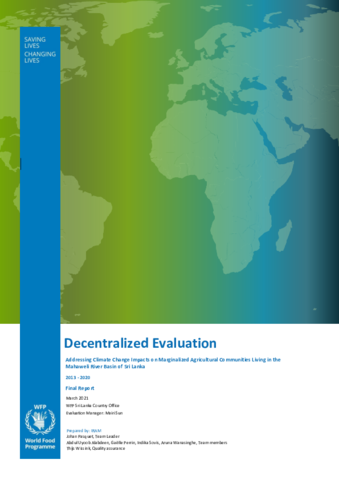
This report concerns the external decentralized evaluation of Addressing Climate Change Impacts on Marginalized Agricultural Communities living in the Mahawell River Basin, Sri Lana a project financed by the Adaptation Fund (AF) and implemented by the WFP in partnership with the Ministry of Environment and wildlife Resources (MEWR) and the Unit UNDP.
This evaluation, which has as its objectives accountability and learning is commissioned by the WFP Sri Lanka CO and concerns the full implementation period from 20213 to September 2020. Gender equality and empowerment of women (GEEW) is integrated throughout the evaluation. The main expected users of this evaluation are WFPCO, UNDP and MEWR, as well as field-level government partners.
Vulnerability to climate change in Sri Lanka is characterized by high exposure to extreme weather events, associated natural hazards such as droughts, floods and landslides, and high rainfall variability. Rural populations are generally harder hit, including those living in the Mahaweli River basic.
The project, often referred to as the Climate change adaptation project (CCAP), aims to secure livelihoods and food security against rainfall variability, and in particular droughts. It focused on climate shock-prone communities in three Divisional Secretariat Divisions (DSDs) of the rice basin (Medrigiriya, Lankapura and Walapane), with a focus on small holders who primarily reply on rainfed agriculture or minor irrigation schemes. Initially planned for a three year period CCAP has been extended at no additional cost on four occasions, the last one related to COVID-19 crisis.
